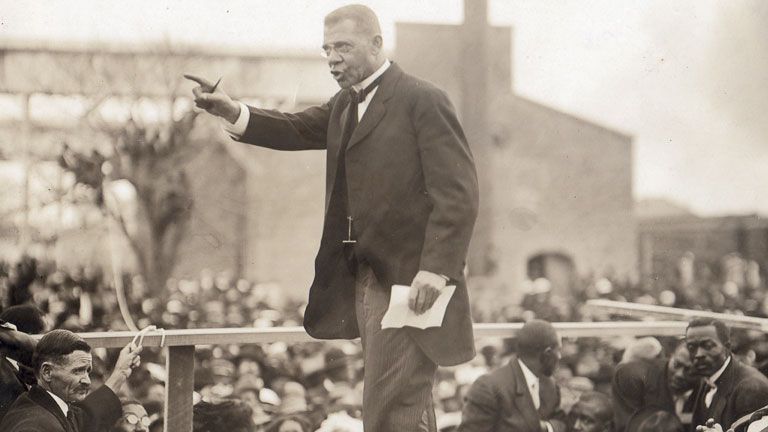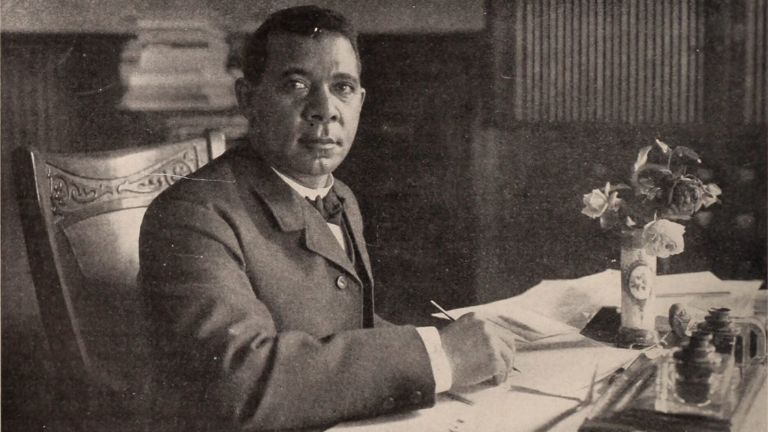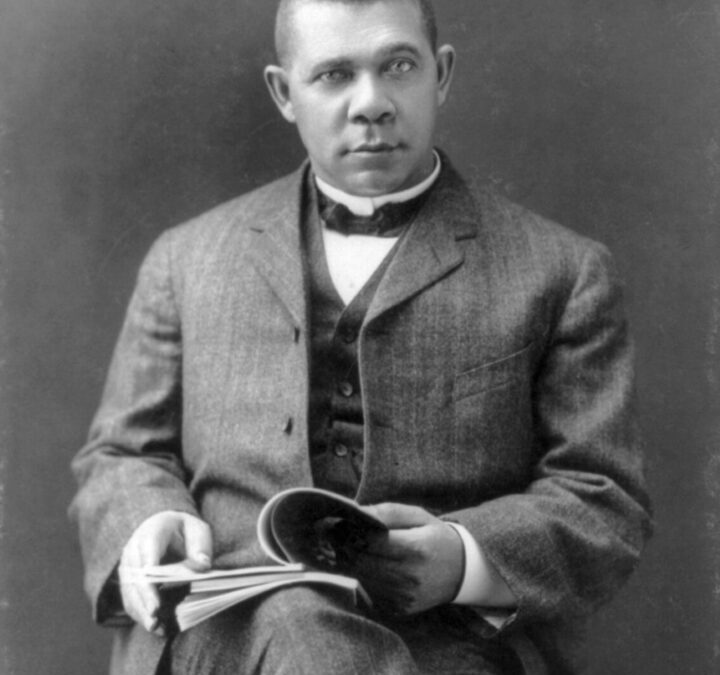There’s no denying the immense impact Booker T. Washington had on the history of African American education in the United States. As a prominent educator, author, and orator, his tireless efforts paved the way for countless African Americans to access quality education and opportunities for social and economic advancement during a time of deep segregation and inequality. Through his leadership at the Tuskegee Institute and his influential writings and speeches, Washington remains a revered figure in the fight for educational equity and civil rights.

Early Life and Liberation
Birth and Early Childhood
For Booker T. Washington, life began on April 5, 1856, in Franklin County, Virginia. Born into slavery, Washington never knew his father and his paternity remains unknown. His mother, Jane, was a slave on the Burroughs plantation. Washington’s early years were marked by poverty and hardship, but he was instilled with a strong work ethic and a determination to learn.
The Emancipation and its Impact
To Booker T. Washington, the Emancipation Proclamation of 1863 was a pivotal moment in his life. At the age of nine, he and his family were freed from slavery. The abolition of slavery presented new opportunities and challenges for Washington, who saw education as the key to a better future for himself and his community.
Impact
The Emancipation Proclamation not only granted freedom to enslaved individuals but also sparked a newfound sense of hope and possibility among African Americans. For Washington, it meant the chance to pursue an education and work towards equality and empowerment for his people.
Educational Pursuits
Hampton Institute Experience
Experience at the Hampton Institute was a turning point in Booker T. Washington’s life. He arrived at the institute with limited education but a strong drive to learn and improve himself. Under the guidance of General Samuel C. Armstrong, Washington embraced the philosophy of industrial education, which emphasized acquiring practical skills alongside academic knowledge. This experience laid the foundations for his future educational endeavors and leadership style.
Founding of the Tuskegee Institute
The establishment of the Tuskegee Institute in 1881 marked a significant milestone in African American education. Washington’s vision was to create a school that would provide vocational training to former slaves and their descendants. The Institute’s mission was to equip students with the skills needed to succeed in a post-Civil War society while promoting self-reliance and economic independence. This innovative approach to education set the Tuskegee Institute apart and garnered widespread support.
Institute’s impact went beyond the walls of the campus, as Washington’s influence and teachings inspired a generation of African Americans to strive for excellence and uplift their communities. The Tuskegee Institute became a beacon of hope and empowerment for many, embodying Washington’s belief in the transformative power of education.

Washington’s Philosophy and Works
The Atlanta Compromise
For Booker T. Washington, the Atlanta Compromise was a strategic approach to race relations in the United States. In his famous speech at the Atlanta Exposition in 1895, he urged African Americans to temporarily accept segregation and disenfranchisement in exchange for economic advancement and educational opportunities. Washington believed that through vocational training and economic self-sufficiency, African Americans could gradually earn the respect and acceptance of the white population.
Contributions to African American Education
American educator Booker T. Washington made significant contributions to African American education by founding the Tuskegee Institute in Alabama in 1881. This institution focused on providing vocational and practical education to African Americans, teaching skills that would empower them to thrive in a post-slavery society. Washington’s philosophy emphasized the importance of self-reliance, hard work, and economic independence as the keys to racial progress.
For instance, Washington’s emphasis on practical skills like carpentry, agriculture, and mechanics helped many African Americans gain employment and establish successful careers in trades that were important for the growth of the South. By promoting education that was relevant to the needs of the black community, Washington’s legacy continues to inspire African Americans to pursue educational opportunities that lead to sustainable and prosperous futures.
Criticism and Legacy
Controversy and Opposition
Many renowned African American leaders and intellectuals at the time, such as W.E.B. Du Bois, criticized Booker T. Washington’s emphasis on vocational education over academic education. They believed that Washington’s accommodating approach perpetuated segregation and limited opportunities for African Americans to receive higher education and excel in professional fields.
Long-term Influence on Education and Civil Rights
Criticism aside, Booker T. Washington’s legacy remains influential in the realms of education and civil rights. His establishment of the Tuskegee Institute laid the foundation for African American students to receive practical education and vocational skills that were crucial for economic independence and social progress in the post-Reconstruction era.
Washington’s approach also inspired future leaders to advocate for educational opportunities as a means of empowerment in the fight for civil rights. His emphasis on self-reliance and industriousness continues to resonate within African American communities striving for equality and socioeconomic advancement.
Educational institutions and programs across the country still draw inspiration from Washington’s philosophy of hard work, perseverance, and community upliftment, demonstrating the enduring impact of his contributions to African American education and the broader civil rights movement.
Conclusion
Taking this into account, Booker T. Washington remains a significant figure in the history of African American education. His dedication to uplifting his community through educational empowerment laid the foundation for future generations to strive for excellence. Through his work at the Tuskegee Institute and his influential leadership, Washington inspired countless individuals to pursue knowledge and achieve success despite facing immense challenges. His legacy continues to resonate today, reminding us of the importance of education as a tool for empowerment and social progress.
FAQ
Q: Who was Booker T. Washington?
A: Booker T. Washington was a prominent African American educator, author, and leader who was born into slavery and later became one of the most influential African American figures in the late 19th and early 20th centuries.
Q: What is Booker T. Washington known for?
A: Booker T. Washington is best known for being the founder of the Tuskegee Normal and Industrial Institute, now known as Tuskegee University, and for his efforts to promote vocational education among African Americans as a means of economic self-reliance.
Q: What was the significance of Booker T. Washington’s Atlanta Compromise speech?
A: Booker T. Washington delivered his famous Atlanta Compromise speech in 1895, where he called for African Americans to focus on economic advancement through education and entrepreneurship, rather than seeking social and political equality immediately. This speech was significant in shaping African American strategies for progress in the Jim Crow era.
Q: How did Booker T. Washington’s educational philosophy differ from W.E.B. Du Bois?
A: Booker T. Washington emphasized vocational and industrial education for African Americans, believing that economic independence would lead to social equality over time. In contrast, W.E.B. Du Bois advocated for classical education and civil rights activism as a means to achieve equality for African Americans.
Q: What is the legacy of Booker T. Washington in African American education?
A: Booker T. Washington’s legacy in African American education is profound. He established a model of education that focused on practical skills and self-reliance, which helped many African Americans attain economic independence and paved the way for future generations of African American educators and leaders.
See also our article: The history of Juneteenth celebrations










